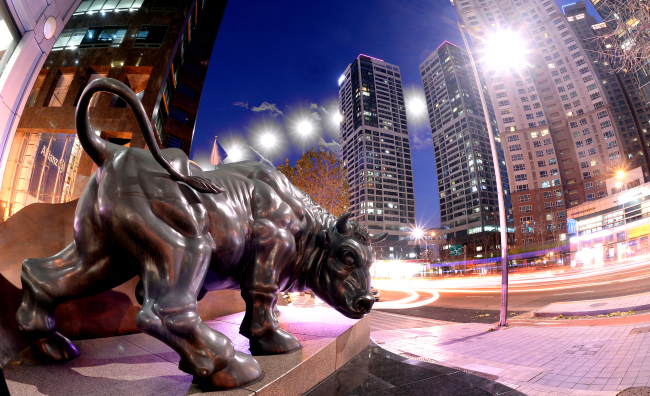LG Chem, Samsung Biologics close in on SK hynix market cap
By Son Ji-hyoungPublished : Aug. 12, 2020 - 18:09

The market capitalizations of biopharmaceutical company Samsung Biologics and chemical-to-battery firm LG Chem have soared over the past six months, reflecting market interest in IT and bio sectors amid the coronavirus pandemic.
Samsung Biologics’ market cap came to 55.7 trillion won ($47 billion) as of Wednesday, the third-largest in Korea‘s main stock bourse Kospi, data by the Korea Exchange showed Wednesday. This was followed by the fourth-largest LG Chem, whose market cap stood at 52.3 trillion won.
Over the past six months -- from Feb. 17 until Wednesday -- LG Chem’s market cap surged 76.7 percent, while Samsung Biologics‘ stock rose 62.7 percent.
Naver, Korea’s internet giant that operates the nation‘s largest web portal, saw its market cap grow 61.6 percent to 50.1 trillion won, becoming the fifth-largest in Kospi bourse.
The uptrend in the selected Korean sectors, including secondary batteries, biotechnology and internet services, showed contrast with semiconductor maker SK hynix.
The market cap of SK hynix shrank by 22.8 percent to 59 trillion won, narrowly keeping its No. 2 position from its new chasers Samsung Biologics and LG Chem, while further widening the gap with Samsung Electronics’ 352.2 trillion won, as of Wednesday.
Market watchers say the coronavirus impact on the stock market is affecting prices of certain stocks, locally dubbed “BBIG7,” an acronym that refers to sectors where seven large-cap stocks are dedicated -- biotechnology (Samsung Biologics and Celltrion), batteries (LG Chem and Samsung SDI), internet (Naver and Kakao) and games (NCSoft).
Such newly emerging stocks are in the spotlight for their “ability to adapt to the fourth industrial revolution and post-coronavirus trend,” wrote Kim Yong-gu, an analyst at Samsung Securities, in a note Wednesday. Kim added the setting could further accelerate the retail investment in Korean stock market that has so far amounted to some 36 trillion won on Kospi this year.
The nation‘s stock market has been buoyed by retail investors dubbed “ant warriors” on the back of high liquidity, as well as by temporary regulations on short selling activities. Following a rollercoaster ride due to the impact of the coronavirus, Kospi rose by 8.5 percent from Feb. 17 to Wednesday, extending a winning streak for eight trading days.
By Son Ji-hyoung (consnow@heraldcorp.com)
Samsung Biologics’ market cap came to 55.7 trillion won ($47 billion) as of Wednesday, the third-largest in Korea‘s main stock bourse Kospi, data by the Korea Exchange showed Wednesday. This was followed by the fourth-largest LG Chem, whose market cap stood at 52.3 trillion won.
Over the past six months -- from Feb. 17 until Wednesday -- LG Chem’s market cap surged 76.7 percent, while Samsung Biologics‘ stock rose 62.7 percent.
Naver, Korea’s internet giant that operates the nation‘s largest web portal, saw its market cap grow 61.6 percent to 50.1 trillion won, becoming the fifth-largest in Kospi bourse.
The uptrend in the selected Korean sectors, including secondary batteries, biotechnology and internet services, showed contrast with semiconductor maker SK hynix.
The market cap of SK hynix shrank by 22.8 percent to 59 trillion won, narrowly keeping its No. 2 position from its new chasers Samsung Biologics and LG Chem, while further widening the gap with Samsung Electronics’ 352.2 trillion won, as of Wednesday.
Market watchers say the coronavirus impact on the stock market is affecting prices of certain stocks, locally dubbed “BBIG7,” an acronym that refers to sectors where seven large-cap stocks are dedicated -- biotechnology (Samsung Biologics and Celltrion), batteries (LG Chem and Samsung SDI), internet (Naver and Kakao) and games (NCSoft).
Such newly emerging stocks are in the spotlight for their “ability to adapt to the fourth industrial revolution and post-coronavirus trend,” wrote Kim Yong-gu, an analyst at Samsung Securities, in a note Wednesday. Kim added the setting could further accelerate the retail investment in Korean stock market that has so far amounted to some 36 trillion won on Kospi this year.
The nation‘s stock market has been buoyed by retail investors dubbed “ant warriors” on the back of high liquidity, as well as by temporary regulations on short selling activities. Following a rollercoaster ride due to the impact of the coronavirus, Kospi rose by 8.5 percent from Feb. 17 to Wednesday, extending a winning streak for eight trading days.
By Son Ji-hyoung (consnow@heraldcorp.com)




















![[Today’s K-pop] BTS pop-up event to come to Seoul](http://res.heraldm.com/phpwas/restmb_idxmake.php?idx=642&simg=/content/image/2024/04/17/20240417050734_0.jpg&u=)